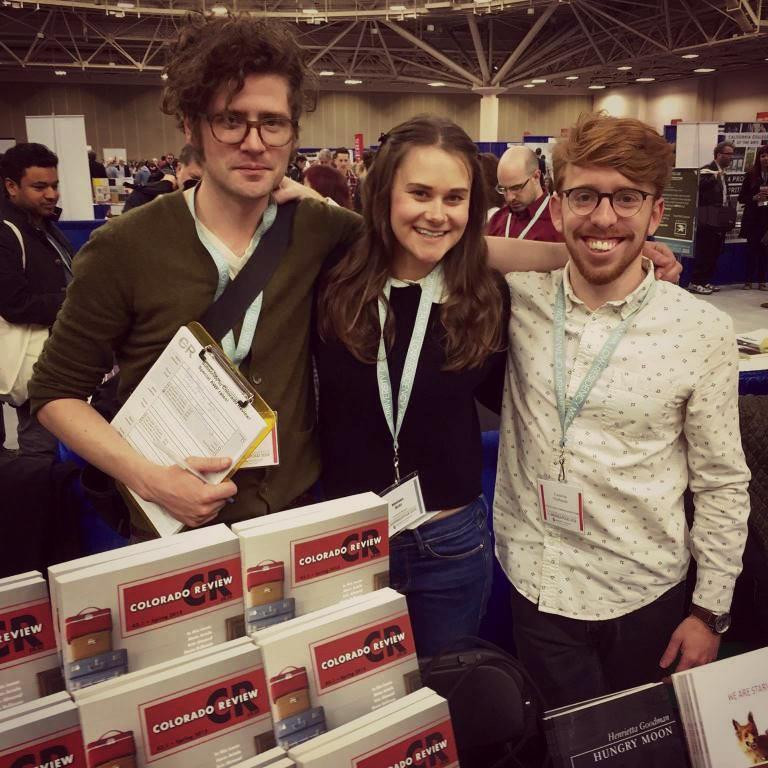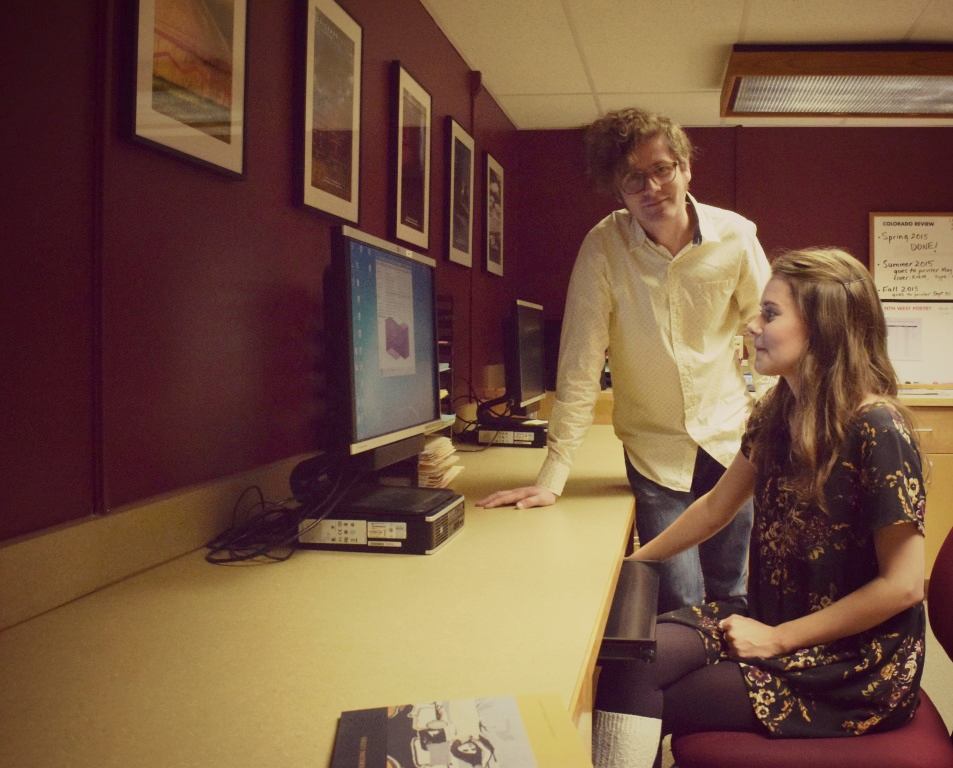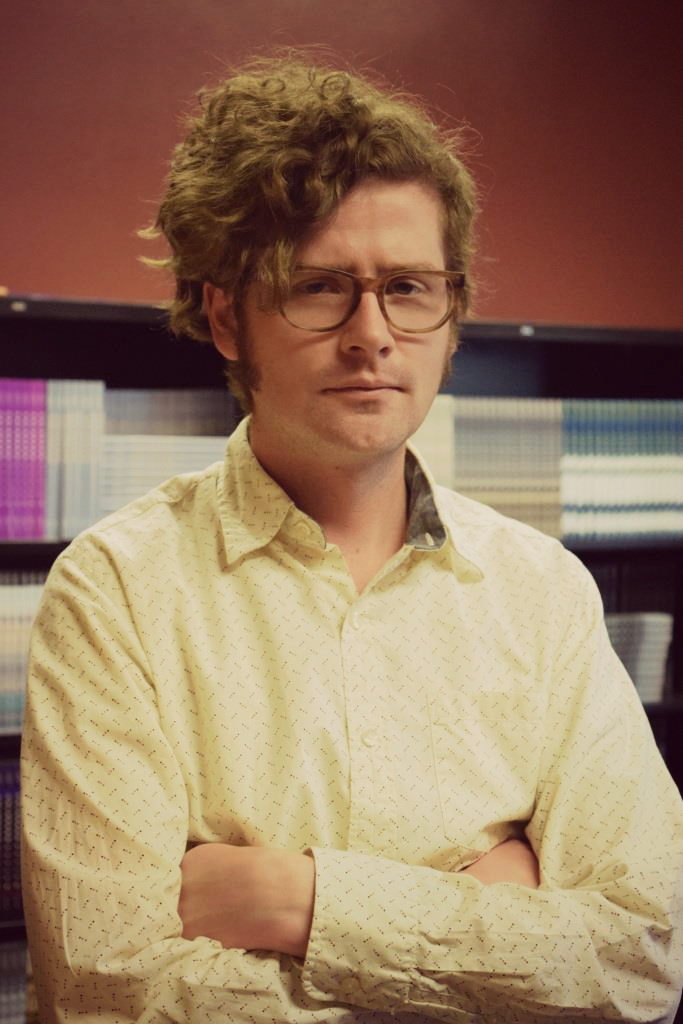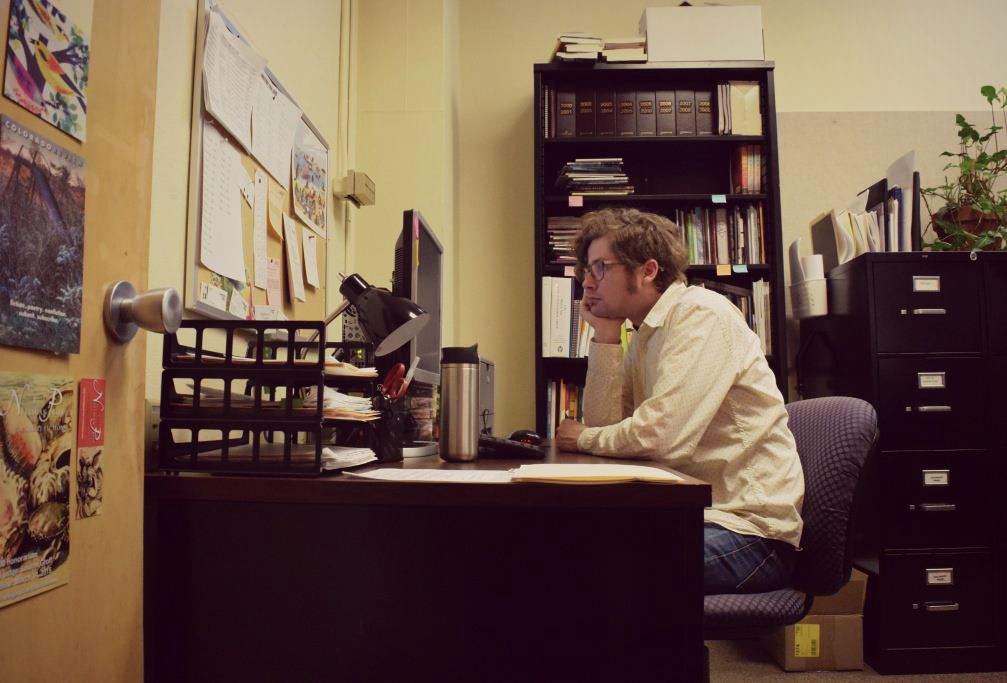Drew Webster
MFA Creative Writing: Poetry, 3rd year
What brought you to CSU?
My decision to attend CSU’s MFA had a couple of motivations. I’m originally from Colorado, but I was living in Oregon when I decided to apply to MFA programs. I really wanted to make poetry the focus of my life, and I realized that I wasn’t really doing that on my own. So, that’s generally why I wanted to come here. More specifically, though, when I started researching the poets on faculty at CSU, I was blown away by their work. It was clear to me that these were people doing good, ethical work. So, studying at CSU represents a turning—a turn toward what is most important to me: making poems, trying to think with poetry; but it also represents a returning—a return home, a return to values that I seemed to have lost along the way.
Favorite class, teacher, project?
That’s a really tough question to answer. I’ve hands-down loved the courses I’ve taken here. If I’m being honest though, it’s all about the workshop for me—three hours a week when individual thinkers come together solely to discuss poetry. That’s not exactly easy to come by, and I’ve really cherished that opportunity. Dan, Sasha, and Matthew are tremendous writers and readers (I wasn’t able to participate in Camille’s workshop, but I’ve been hearing really great things). Subtly, a ground has been laid that I can stand on. Where I go with poetry tends to be recursive, but now I’m walking in circles, rather than spinning in an undefined space, and that’s comforting in a way. I can’t stress enough the respect that I have for the workshop facilitators. The same goes for my peers. I expected the discourse to be rigorous, but I could never have expected the degree to which it is. And the trust we put in each other! That rigorousness, that trust, a lot of that falls on the shoulders of the workshop facilitators, but it takes a group with a common goal to develop that trusting, thoughtful relationship. My work, my thinking would never have reached the modest place it’s now at without the workshop, and I’m really grateful for that.
What are you reading/writing? What are you currently working on?
Well, my head’s been pretty well buried in poetry for the last three years, and I’m still doing that, but I’ve also been trying to let my brain relax a little. I recently read this fantastic novel called The Weirdness, by Jeremy P. Bushnell. It was completely escapist, and I loved it. More seriously, though, I think the last thing I read was from the new collected poetry of Frank Stanford. It’s a really beautiful book.
As for writing, I’ve got a few poems here and there that are in various stages of done-ness. It’s been a lot of revising lately. Or, connecting is maybe a better term for it. I’m trying to write poems to connect my other poems together, to make them feel less discrete, less hermetically sealed. Here, the recursive nature of my work surfaces again. Each time I return to my work, I have to remember what I was thinking, and the poems sort of engage in that remembering process, so that they’re like mnemonic devices that I can return to—to remember what I used to know.
Favorite book, and/or author?
Anyone who knows me, even peripherally, knows what the answer to this is. I’ve got something of an obsession with the poet Jack Spicer. His collected work, My Vocabulary Did This to Me, is really, really important to me. I find myself returning often to that and a book of his lectures called The House that Jack Built. His work also lays the groundwork for my own.
What advice do you have for current English students?
Don’t be afraid to say no. This world will tear you in a million directions if you let it, and at some point you have to say, “No, I can’t do that.” Don’t get me wrong—do what you do at a high level, just know your limits.
What advice do you have for prospective students?
Seriously consider doing an internship at the CLP. I cannot overstate how important it has been to my understanding of the publishing field—not only with respect to the production end of it, but how I fit into it as a writer.

Why is it important to study the humanities?
An understanding of the human experience means approaching it from different perspectives. The role of the humanities in this should be obvious, human is in the root word. With other disciplines, the emphasis is on the knowledge itself, and how that knowledge can be utilized, and those are important concerns.The disciplines found in the humanities, however, have another kind of value. Actually, they can be in valued in many of different way, but what I’ve been thinking about a lot lately is turning. The humanities turn toward the human. Why do we perceive the way that we do? How do we create our own perception of ourselves, our social reality, and the reality beyond that? The answers to these questions are often times ambiguous, leading to more questions; and often times they are ethical. Not whether we can apply knowledge, but what is the responsible way to do so? We are always living in tumultuous times. Now is no different. What has been happening in Ferguson, what is happening right now in Baltimore, these are human issues. We have to turn toward them, not away from them—the humanities help us understand the ways in which that turning can remain open.
You are the Managing Editor at Colorado Review – tell us a bit about that work.
My work at the CLP over the last school year has been really fulfilling—I’ve learned so much from Stephanie G’Schwind, our editor. A lot of the stuff I do is detail oriented. Stephanie has been really great about handing me the reins for the production of the poetry in Colorado Review. I’ve been tasked with drawing up and tracking contracts; overseeing the typesetting, copyediting, and proofreading of the poetry; I communicate with the authors about their contracts and, when it comes time, about the proofs for their work. That work has been really awesome and fulfilling. There’s also a lot of work that isn’t exactly exciting, but someone has to do it. I log all of our paper submissions into a database to keep track of them. It means opening and organizing a lot of mail. Don’t get me wrong, I learn a lot from this too. There is a certain kind of joy in the work that isn’t “exciting.” That work that no one else wants to do, I don’t mind it. I like the repetition of it. It’s cyclical. I also handle a lot of the general email for the CLP. Lots of people have questions about our submission guidelines, things like that, and I’m usually the one who directs them to a resource that’ll answer their questions or troubleshoots with them a way to resolve their issue. In a lot of ways, I have to be the face of the CLP and CR for people. That’s a lot of responsibility, and I take it pretty seriously. A lot of what it means to be an editor, I’m learning, is finding a gracious way to say “No.” I find myself, humbly as I can, saying, “No” a lot. Stephanie has been incredibly patient with me in this regard. I had her looking over a lot of my emails at first—to make sure I was conveying the right tone. After a while, I picked it up, and I think I’m doing a pretty good job with that now. So, really, it’s managing the day-to-day. Something is always in progress at the CLP, and I’m here to assist Stephanie with the processes that she has established and/or maintained, so that we can continue to put out good quality literary work.
What’s the best thing about the Center for Literary Publishing? What do you want to make sure people know about it?
The opportunities afforded through it. Of course, we’re always reading through our queue of unsolicited submissions (I really try to shy away from the term “slush pile,” there’s something unkind about that term, I think), but there’s a lot of other stuff going on that translates as valuable experience for interns. There’s always the typesetting, copyediting, proofreading, and cover design for CR. We also run the Colorado Prize for poetry every year. The manuscripts are read and chosen by outside judges (this year Laura Kasischke—she chose Stephanie Lenox’s The Business, so look for that next year), but the production of the book happens entirely in-house. So, again, that’s going to be typesetting, copyediting, proofreading, and cover design. We also have the Mountain West Poetry series. That series is curated by Stephanie and poetry editor Donald Revell. It showcases work from poets who reside in the mountain west. We put out two books a year with that series, and we need copyeditors, etc. for that as well. That kind of experience, working as a copyeditor for example, is really valuable, and not just in the publishing field. Any institution that has copy, print or online, is going to have an editor for that copy. Working at the CLP means, a lot of times, developing the tools necessary for that kind of work. An intern who has worked at the CLP for at least four semesters is going to be a viable candidate for a lot of work on the other side of their degree, and that’s really awesome.
What would you like to say to prospective CLP interns?
Don’t be afraid to ask questions and volunteer yourself. Stephanie has conceived of the CLP as a teaching press. What this means is that we’re not only interested in publishing great literary writing (though, that is pretty important), we want to teach interns what that means, and teach them skills that they can carry over to potential careers. There are always opportunities available, just ask what you can do.

Favorite CLP memory?
At the beginning of every year, we have a staff meeting. There’s an ice breaker and some pizza, then we talk about logistics of the CLP for the coming year. Well, the ice breaker this year was “What was your worst job.” All I remember is trying to choke down a piece of pizza while Whitney Dean (a nonfiction writer who graduated in 2014) told us about how she used to have to cremate dogs for animal control. I got the pizza down, but I…I was never the same.
Where do you see yourself in five years?
I’m wary of the oracular procedure, but if I’m practicing what I’m preaching here, that’d be something with these skills that I’ve been trying to foster. What that’s going to look like right now, I have no idea. Who knows though, maybe I’ll retire.
Considering doing an internship in the fall? As the spring semester winds down it can difficult to think about anything but finishing up course work, completing finals, and the promise of summer break. Even so, students may find themselves considering internships for the fall semester. The Center for Literary Publishing (CLP) Internship Program is one option for graduate students. CLP interns serve as first and second readers for the nearly nine thousand manuscripts of fiction, poetry, and nonfiction that Colorado Review receives every year. Interns also have opportunities to copyedit, proofread, and typeset; learn about book & magazine design, production, and management; gain proficiency in current industry software (InDesign, PhotoShop, Illustrator, FileMaker, WordPress, and Submittable); participate in social media campaigns; and assist in grantwriting.


